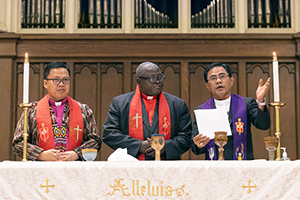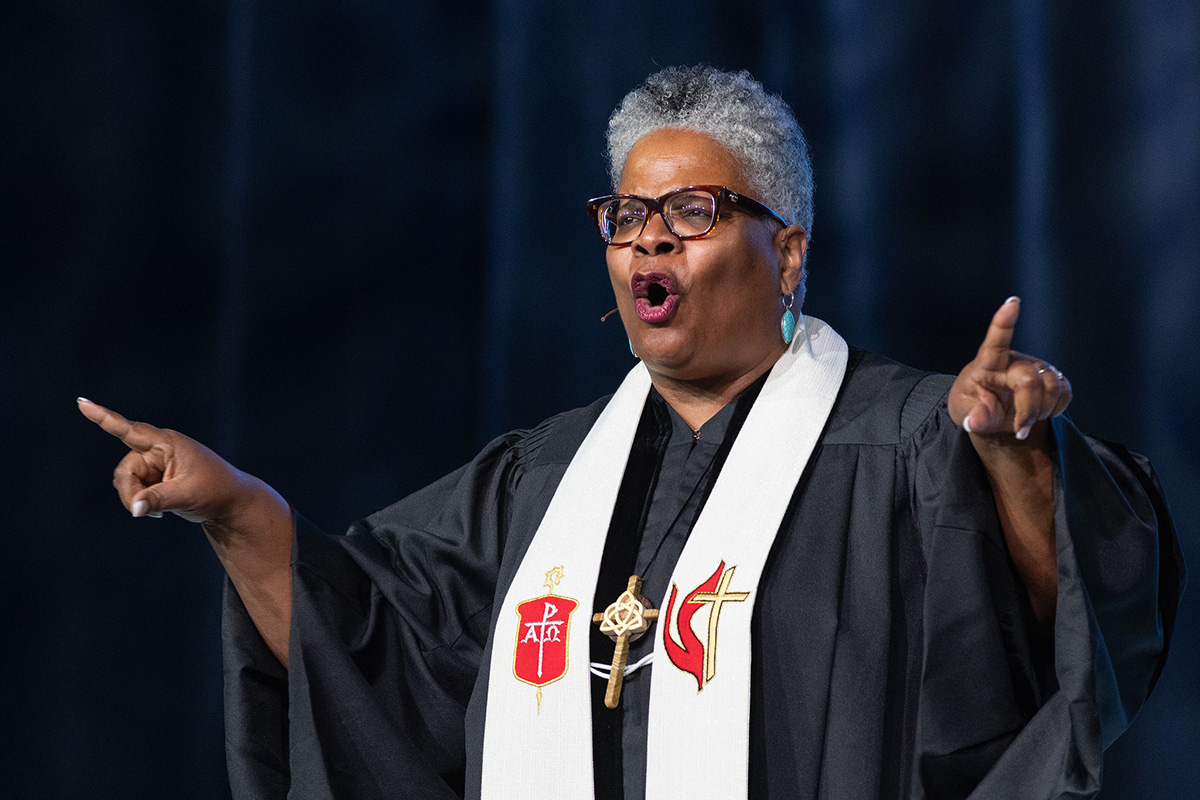Key points:
- General Conference delegates in Charlotte, North Carolina, participated in Thursdays in Black, an initiative of the World Council of Churches that encourages wearing black clothing on this one day of the week to call attention to rape and violence against women.
- Preaching on Thursday morning, Bishop LaTrelle Miller Easterling raised her voice to tell women who have suffered abuse: “You are strong. You are brave. And you are beloved of God.”
- Too often, she said, silence “has been the church’s response to domestic abuse, intimate partner violence, rape as a weapon of war, incest, violence against the transgender community, as well as the abduction and disappearance of Indigenous women.”
In many cultures, the color black is a symbol of mourning, an absence of light and hope. But on April 25, General Conference delegates claimed black as a symbol of resistance and resilience, calling attention to rape and violence against women and vowing to end the church’s silence and inaction.
Thursdays in Black, an initiative of the World Council of Churches, encourages wearing black clothing on this one day of the week to witness to realities, like those reported by the United Nations. Among those is that globally an estimated 736 million women — almost one in three — have experienced physical and/or sexual intimate partner violence, non-partner sexual violence, or both, at least once in their life.
One of these women, Bishop LaTrelle Miller Easterling, episcopal leader of the Baltimore-Washington and Peninsula-Delaware annual conferences, stood before General Conference on Thursday morning and testified to the damage the church can do when it is silent on this issue.
Too often, she said, silence “has been the church’s response to domestic abuse, intimate partner violence, rape as a weapon of war, incest, violence against the transgender community, as well as the abduction and disappearance of Indigenous women.”
As a survivor of domestic violence in a previous marriage, Easterling shared that when she entered the ministry, she was urged not to reveal that part of her life.
“I was told to be silent about that painful part of my past. They said it would make me look weak and women in ministry already have enough battles to overcome,” she said.

General Conference photos
The silence in the church about violence against women can be deafening, but Easterling raised her voice to tell all women who have suffered abuse: “You are strong. You are brave. And you are beloved of God. You are fearfully and wonderfully made. You are created in the Imago Dei. Don’t you ever let anyone tell you otherwise. You are of sacred worth. You are resilient.”
To the church, Easterling said, “Stop making us invisible! Speak our names! Minister to us and speak words of hope and health and healing, and holistic sacredness into our lives.”
The church cannot simply bandage the wounds of the abused, she said. “We need to speak to the abuse itself,” Easterling asserted. She called on those present to find purpose and direction in Luke 4:16-21 and Jesus’ proclamation that “I have come to liberate, free, uplift and unbind and love. I have come to end oppression, bondage, domination, abuse and hate.”
With those words, Jesus set his plumbline, Easterling said. He laid a foundation for his ministry and said, “This is who I am, and if you claim to be one of my followers, this is who you will be, too.”
Subscribe to our
e-newsletter
However, Easterling said, “we are hypocrites if we celebrate resiliency without acknowledging that the church has been complicit in supporting a pedagogy of patriarchy that fuels a hermeneutic of hubris while too often refusing to dismantle systems of domination.
“None of us can be silent in the face of violence,” Easterling continued. “We must speak liberation and safety. We must preach equality and equity. We must create the opportunity for repentance and accountability. We must open the door for healing. We must loose all from the bondage of abuse, perpetrator and victim alike, because until all are free, none are free. Until all are safe, none are safe. Until all are valued, none are valued. Until all are loved, none are loved.
“God has called us, anointed us, empowered us, prepared us, and provided enough Holy Ghost power for us to right these wrongs. And when we are finally free from this physical, verbal, spiritual, psychological, patriarchal and theological abuse, we will be able to join hands and declare together, ‘the Spirit of the Lord is upon us,’ and we will be silent no more!”
As part of her witness, Bishop Easterling oversees Seeds of Security, a domestic violence/intimate partner violence prevention ministry.
Lauber is director of communications for the Baltimore-Washington Conference.
News media contact: Julie Dwyer at (615) 742-5470 or newsdesk@umnews.org. To read more United Methodist news, subscribe to the free daily or weekly Digests.




